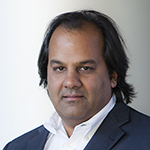November 2015

Atul Malhotra, MD
I often get the question “How does a hardcore intensivist get interested in sleep apnea?” I also frequently hear the comment “Sleep is boring.” Pulmonary, critical care, and sleep medicine are the three pillars of the Society, but I know ATS Sleep and Respiratory Neurobiology Assembly members who refer to sleep as the “forgotten pillar.” To my knowledge I am the first ATS president with an investigative focus in this area, and I would like to take this opportunity to explain my passion for this discipline.
My excitement for the sleep field is based on a number of factors. First, I was always interested in applied physiology. I was attracted to the ICU since I saw each patient as an n=1 physiology experiment in which I could manipulate a variable and see in real time the results. I had great mentors along the way who understood physiology and could apply it at the bedside. I continue to learn physiology from the world’s best, and I strive to communicate this knowledge to the next generation. Despite incredible advances in molecular medicine and genomics, I still maintain that physiology has been and will continue to be a crucial component of meaningful progress. Applied physiology is alive and well in sleep medicine, and more broadly throughout our field. For this reason, I am planning to focus my presidential symposium at the ATS 2016 International Conference in San Francisco, California, on various topics in applied physiology, including sleep apnea pathogenesis.
Second, the sleep field is an exciting area. Because the field is quite young, there are simple questions that have never been asked or answered. We are starting to unravel why sleep is needed and what happens without it. To paraphrase Allan Rechtschaffen, MD, if sleep does not have some essential function, it is the biggest waste of time that God invented.
Sleep in the ICU is equally fascinating given the paucity of data in this area and the potential for medications and non-pharmacological approaches to have a major impact. Despite the major findings of my friend, Wes Ely, MD, MPH, and other ICU researchers, the brain is still often ignored in critically ill patients. Similarly, roughly 87 percent of obese Type 2 diabetes patients and roughly 62 percent of severe COPD patients have clinically important obstructive sleep apnea and yet, despite the acknowledged need for new therapeutic targets, these sleep issues remain largely overlooked. Focus on sleep can have a major clinical impact. The progress that the sleep field has made in the past 10 to 15 years is mind boggling, but clearly there is more to come. When I started in the field as a fellow in 1998, there was considerable debate whether sleep apnea was a confounding variable rather than having a major public health impact as is acknowledged today.
Third, the field of sleep is in need of young talent. Funding for polysomnography, which brought many people and resources to the field, is disappearing, as the push for home sleep testing grows. We must redouble our efforts to attract a pipeline into our field.
I have been blessed with numerous talented trainees who make me look smart, but when I look more globally at the pipeline coming into our field, I am struck by the small numbers. Many of the best and brightest are not going into medicine anymore, and among those who do, very few seem to gravitate towards sleep. The National Heart Lung and Blood Institute has provided fairly dismal statistics on the number of beginner sleep grants that are funded. For example, for the K23 junior faculty career development awards, one can count on one hand the number of them that are focused on sleep.
A great way for a junior person to become quickly recognized and to make a major impact is in sleep medicine. I often joke with colleagues that had I picked another discipline, you probably never would have heard of me.
All of us have been awake all night or jet lagged. We all appreciate how bad it feels to be sleep deprived. Now imagine being a patient with sleep apnea who feels that crummy every single day. Now imagine being that patient feeling horrible who goes to see their doctor, but the doctor does not ask about their sleep because he or she finds the topic boring. The doctor also knows that addressing sleep issues can lead to improvement in important outcomes, but chooses to ignore this information. Something needs to change. Further research, education, and advocacy are necessary to achieve major progress.
Physiology is not dead. Sleep is not boring. Indeed, the field’s potential and ability to unravel some of biology’s greatest mysteries in sleep medicine are exhilarating.

